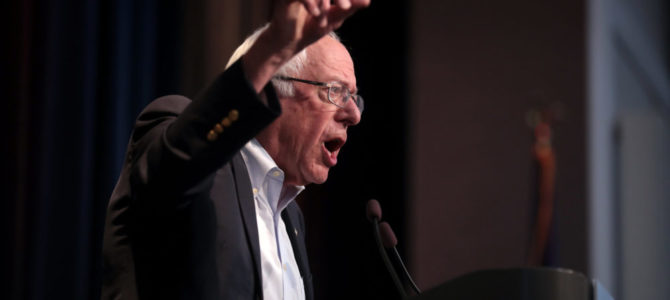
Bernie Sanders has the lead in the Democratic primary and, while far from over, his supporters’ enthusiasm greatly outpaces any of the rival campaigns and he is poised to continue winning contests and delegates. Party leaders and a good deal of their supporters in the media are in a full panic, struggling to derail the socialist insurgent’s campaign before he leads the party to what they predict is electoral ruin and four more years of President Donald Trump.
Republicans, including the president, seem to believe much the same and are cheering Sanders on against the media and Democratic leadership. In The Bernie vs. The Rest primary battle, a good number of GOP politicos see a win in Democratic corruption, cannibalism, and potentially party civil war. In the title match, they predict a win-win — running against a battered and weakened moderate or an easily dispatched and radical socialist.
There are both troubling political and economic reasons, however, that a win against Sanders is far from assured.
Politically, Sanders’s rise, his supporters, and the national mood he is running in mirror the president’s circumstances four years ago, and the primary is an early tell. In 2016, the anointed candidate of the GOP and its top donors quickly faltered, failing to generate crowds or gain leverage beyond early name recognition. On the debate stage, he appeared weak and out of touch in the face of harsh attacks.
With Jeb Bush’s campaign stumbling, professional Republicans scrambled to find a replacement in Marco Rubio or even Ted Cruz, a candidate many of them despised from previous Washington battles. In the end, the anti-Trump Republican vote fractured among several candidates, none of whom were strong enough to take on the front-runner, who only continued to gain speed. It’s true, former Vice President Joe Biden is going to win more delegates than Jeb! ever won and he might even find himself a king-maker at the convention, but there is a very good chance their political fortunes will be the same.
Among supporters, there’s a ring to “I am Bernie Sanders” that “I am not Bernie Sanders” lacks. The former fills young and old voters alike with feverish excitement, while the latter is an uninspiring reflection — yet Sanders’ primary opponents cling to it like some triumphant standard. The difference between charisma and supporters has been visible since weeks before the Iowa caucuses, with Sanders packing rallies while “front-runner” Biden and others struggled to gather interested locals.
Even today, with larger and larger crowds gathering for most of the candidates, Bernie’s crowds easily eclipse the competition. His supporters aren’t looking for an alternative to a candidate, they’re looking for an alternative to the status quo, and they’re highly motivated by this. If they feel their candidate has been screwed by the party, you can be sure they won’t be turning out to vote Democrat.
Donald Trump took advantage of a similar national mood, where voters feel left behind and taken advantage of by an elite that doesn’t share their lives or concerns. The feeling is justified, and while the president has delivered a booming economy and a thundering voice against Washington elites, the national anger and resentment that propelled him to office remains strong.
These are the same feelings palpable among Sanders’ devoted supporters, and they are as much a danger to his Democratic opponents as to his potential general election opponent. This, confident Republicans should know, will be doubly true if there is a recession — a Democratic prophecy that Sanders’s rise might well fulfill.
The U.S. economy beat out the dot-com bubble’s infamous record in July, “marking the longest economic expansion in American history.” The past few years have been powered by deregulation, tax cuts and a Federal Reserve that continues to pump money into the system — and as with all economies, the ghost of recession lies over every hill. Sanders just might be that ghost.
As the senator continues his march toward the nomination, stock-market investors will give him a higher and higher chance of winning the presidency. Stocks are largely a confidence game, and this is not good for that confidence. Investors in the many industries Sanders has targeted, including tech, health care, energy, banking, pharmaceuticals and more, will have real reason to be nervous. All it takes is people to start to hedge and hedge, then hedge some more; and following Sanders’ sizable weekend win, some market analysts are seeing just that.
A 5.3 percent drop in the markets between now and the fall is broadly regarded as a recession — just in time for the election. Combine the ghost of Sanders with the growing likelihood of a global pandemic, and incoming economic pain seems near certain — and very possibly far worse than 5.3 percent. This, you can be certain, is terrible news for a divisive incumbent president up for reelection.
The percentage of Americans who think our country is heading in the right direction bodes well for Trump. And yes, a Chinese-generated crisis combined with an abrupt end to Asian supply chains plays decently to the president’s hawkish stance and warnings toward Beijing. But a fiery and transformational opponent in the midst of economic downturn poses a very real threat to Republican victory. They’d best take notice.









